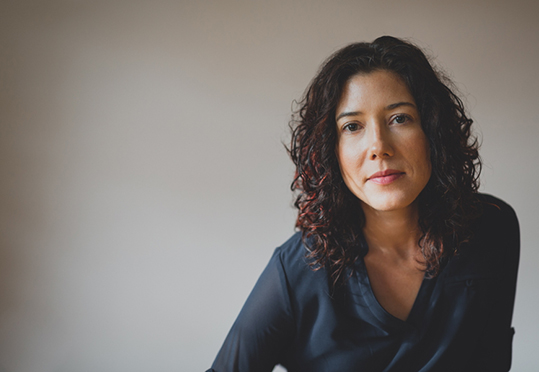 Maggie Messitt is spending a semester on the Elizabethtown College campus as she writes her new book. The story, which she calls a “hybrid of memoir and investigation,” follows the life of a missing family member. While writing, she realized, she is learning about herself.
Maggie Messitt is spending a semester on the Elizabethtown College campus as she writes her new book. The story, which she calls a “hybrid of memoir and investigation,” follows the life of a missing family member. While writing, she realized, she is learning about herself.
“I was that kid that was obsessed with documentaries really early on,” said the Bowers Writers House Scholar-in-Residence. “And I was the one that sat in the library or the bookstore, only in the biography section.”
Her interest in documentaries and biographies steered her toward a major in print journalism at Boston (Massachusetts) College. After earning her undergraduate degree, Messitt attended grad school, only to learn that her areas of interest required more than dedication in the classroom.
I went with a one-way ticket and a year-and-a-half visa and ended up staying eight years.”
“I realized that to do the type of writing I wanted to do, I actually needed to do some living,” Messitt said. “I needed to live and experience the outside world so I could bring more to the classroom.”
After choosing to “do some living,” the author moved to San Francisco, California, where she taught language arts at an inner city junior high school. Messitt’s students became pen pals with students in a class taught by one of her friends in South Africa. To bolster this, she introduced South African literature to her students and, later, traveled there to meet the students with whom she had communicated.
“I went with a one-way ticket and a year-and-a-half visa and ended up staying eight years,” she said.
While abroad, Messitt was informed that her teaching position in San Francisco no longer existed and, rather than return to the states, she remained in South Africa to work. Her interest in the rural areas of the country and the post-Apartheid environment led her to begin writing her first book, “The Rainy Season.”
“I was trained to be a writer and I was really driven by social justice and human rights issues,” she said.
“The Rainy Season” tells the story of a South African town, Rooiboklaagte, and the changing environment it faces. Post-apartheid, the community found itself “caught between a traditional past and a Western future,” she said. Through the lives of three characters, Messitt examines this and other realities of daily life in South Africa.
Research for her second book, “Art(i)fact,” which tells the story of the life of her missing Aunt Debbie, is her focus while at E-town. In the book, Messitt follows her relative’s story from city to city, in order to construct an image of the woman she knew largely through letters. It also delves into topics — religion and mental health — that help her understand the path her aunt followed.
In addition, the book tells the story of the places and people, from Yelm, Washington, to Payaya, Hawaii, with whom Aunt Debbie interacted.
“So much of understanding a person is understanding where they have been …” Messitt said.
According to the author, “Art(i)fact” varies from “The Rainy Season” in a number of ways, but mostly because Messitt, herself, is a character in the second work. This latter story is more research driven than her earlier work, she said. While in South Africa, much of what she learned was through field work. Conversely, “Art(i)fact” has required both immersive and library research.
She never intend to write this story. And, once researching, did not intend to write herself into it. But, as she moved forward with the research, she found that it was a story that needed to be told. Feeling several connections to her aunt, including their family situations and aspirations, the author also realized that the readers would expect her to be a part of the tale. With a collection of letters on which to build, Messitt began.
When completed, the book will serve as her dissertation as a Ph.D. student at the University of Ohio. Her choice to leave graduate school and return years later, through a program style called low-residency, allowed her to continue her work in South Africa and get her master’s in fine arts. Though her academic path was nontraditional, she felt it was suitable to her lifestyle, interests and plans.
“Making sure that I have both an academic life and a really solid professional experience makes me a very different student,” she said. “I think that is the exciting part for me: I am able to find ways to talk about my fieldwork and my professional life but inside of an academic setting.”
One of the requirements of her stay at E-town is to interact with the students. To meet this expectation, Messitt is delivering three lectures, sitting in on the travel writing class once a week and working with student research assistants. The student assistants will research some of the themes in Messitt’s book, including death and dying, religious traditions and the human identification system.
Junior professional writing major Katelyn Gebbia is among the eight students who are participating in this group this semester. Gebbia said it was the story of Messitt’s aunt that intrigued her and encouraged her to sign up.
“I am most looking forward to getting to learn more,” Gebbia said. “With crime shows we think we know how criminal justice works, but this is a real chance to actually learn a little bit about how it all works.”

